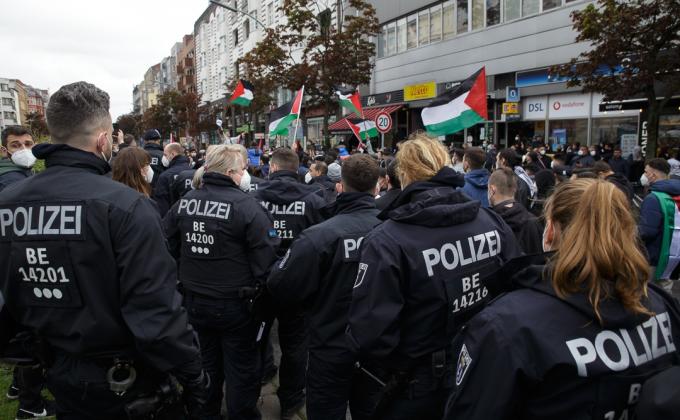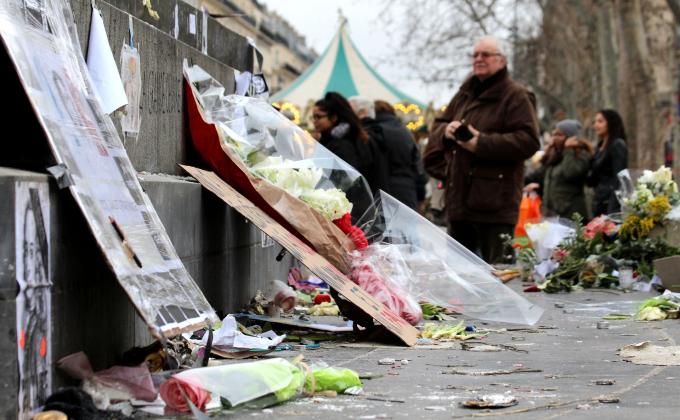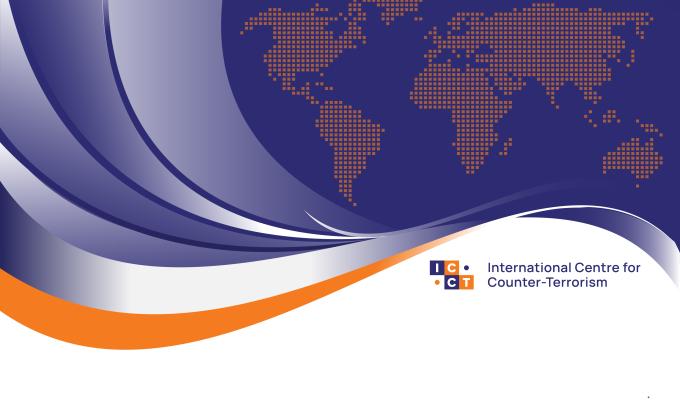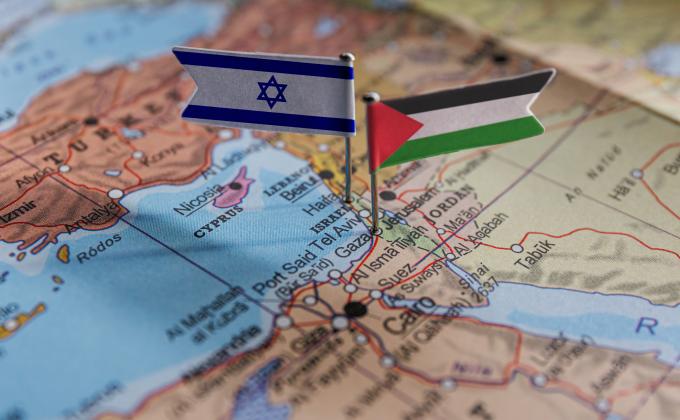Professor Ben Saul is the incoming UN Special Rapporteur on the Promotion and Protection of Human Rights and Fundamental Freedoms while Countering Terrorism. ICCT's Senior Program Manager Tanya Mehra sat down with Professor Ben Saul to discuss the Israel-Gaza crisis from an international humanitarian law perspective.
Tanya Mehra (TM): I'm very glad to have you here with us today to discuss the Hamas-Israel conflict from an international law perspective. So, Ben, could you explain how international humanitarian law applies to both parties in the conflict, and which violations are likely to be committed by both parties?
Ben Saul (BS): It's great to be with you, Tanya, and thanks very much for having me. International humanitarian law is designed to apply equally to all sides in an armed conflict, regardless of who started the conflict, who's acting illegally or otherwise by invading another country, or who's attacking or defending. All of the rules on the conduct of hostilities apply equally to both sides. That's really to ensure that there are always humanitarian constraints on the way that wars are fought, so that one side doesn't claim that it's fighting a just cause, like self-defence or self-determination, and then pull out all stops without any restraint shown towards completely innocent civilians.
In this conflict, I think it's really clear that Hamas at the outset committed a series of gross violations of international humanitarian law and many war crimes. It murdered over 1,200 people in the initial attack, wounded thousands more, and took over 200 people hostage, which is a war crime under international law. It's held people in seemingly inhumane conditions. It's, perhaps, desecrated, or mutilated corpses, and it may have committed sexual violence. Its pattern of indiscriminate rocket attacks fired towards Israeli civilians is also illegal, as international humanitarian law prohibits firing a crude, inaccurate weapon in some direction in the hope that you might hit something military, because that could equally hit civilians who are protected.
I think Hamas’ pattern of violence also could be the war crime of intentionally spreading terror amongst a civilian population under customary international law. Many of those acts could also constitute crimes against humanity by being part of a widespread or systematic attack on the Israeli civilian population or part of it. There’s even a possible argument of genocide to the extent that this pattern of attacks was intended to deliberately destroy part of the Jewish people.
On the Israeli side, it is very clear that refusing for over two weeks to allow humanitarian relief to come into Gaza is prohibited under international humanitarian law. States have an obligation to allow and facilitate the rapid and unimpeded flow of necessary humanitarian relief to ensure the survival of civilians. And indeed, intentionally starving a civilian population is a war crime. Now, I know that in recent days, some humanitarian relief trucks have been getting across the border from Gaza, but not many. Maybe 100, a little more than that, for a population of more than two million civilians who've had nothing coming into Gaza for almost three weeks. I think that's a really fundamental violation of one of the most basic rules of warfare - you can't starve civilians, even if you are fighting a war of self-defence.
In relation to other things Israel's been doing, I think it is somewhat more difficult to judge for the reason that you often need to know a lot more about the targeting process Israel has gone through, and what kind of information it's used in over 11,000 strikes over the last three weeks. Each one of those strikes requires Israel to take ensure that the target they're attacking is only military, not civilian; that the attack would not be indiscriminate; and that attacking would not cause excessive civilian casualties relative to the military advantage anticipated. This is last rule is known as the proportionality rule. International humanitarian law does tolerate killing some civilians, where they are incidental casualties of a lawful strike on a military target. But it is difficult to know without having more information from inside that targeting process, about whether Israeli forces were exceeding the rules that they must respect when they make those targeting decisions.
Certainly, the extent and scale of the extensive devastation to civilian infrastructure in Gaza, in a very densely populated area, may indicate a lack of sufficient care or caution by the Israeli forces in sparing civilians. This is particularly the case where Israel's warnings to people to leave have not been effective, because there are just too many people to evacuate and too short a space of time, and nowhere sufficiently safe for them to go. Israel has continued to bomb southern Gaza, even while telling people to go there because it's supposedly safe. Israel has also used large explosive munitions in confined urban areas, heightening the risks of both indiscriminate and disproportionate attacks.
TM: I’d like to follow up on two related aspects. One is the displacement of the Palestinians by Israel - could that constitute a violation as well of international humanitarian law? Second, you mentioned already that some of the acts committed by Hamas including spreading terror, could indeed constitute a war crime. What does the designation of Hamas as a terrorist organization mean when it comes to international humanitarian law and international law?
BS: So on the first question, Israel absolutely has a duty to warn civilians of impending attacks, and it made a general warning to the civilian population in the North. The issue there, though, is that warnings must be effective. That means not only that they have to reach the civilian population, but that they are reasonably capable of being acted upon by that population. That means that people have to be in a position to be able to move in a relatively safe way, before the attack commences, and be given sufficient time to move and that all of the exigencies of human life have to be considered. If people are disabled or young or bedridden, there are all kinds of reasons why it might be difficult for people to move under wartime bombardment conditions. I think there have been real issues on that front all the while, of course, being told to move to the south of Gaza where there is no food or water or electricity. So it really is an utterly dire humanitarian situation.
On the second question of the designation of Hamas as terrorist by some governments, there isn’t an international consensus on this prior to this most recent conflict. Hamas wasn't listed by the Security Council, for example, but many, certain governments in parts of the world have listed it. That's irrelevant to international humanitarian law because the critical point is that regardless of who the actor is, whether you're a terrorist or fighting terrorists, both sides must always respect international humanitarian law. Certainly there has been a further argument that the intensity of Israel's siege against Palestinian civilians could also constitute a form of prohibited collective punishment of all Palestinian civilians if it's designed to somehow punish them, or intimidate them, for their perceived support for Hamas.
TM: How can it be ensured, and who can ensure, that both parties in the conflict abide by international humanitarian law? Especially in light of what we've seen over the weekend of 28/29 November - there was a blackout, and the access to Gaza is currently very limited.
BS: Under international humanitarian law, firstly the obligation falls on the parties themselves to ensure that they respect the law and hold their own forces accountable for any violations. Unfortunately, we know that Israel has a pretty poor record of holding accountable its own forces, when they have been clearly documented violating international humanitarian law in a host of prior conflicts as well as in the day-to-day occupation in the in the West Bank. Secondly, all countries have an obligation under the Geneva Conventions of 1949 to ensure respect for international humanitarian law, and that includes by other states or even non-state actors. So, to the extent that other countries have influence with the parties, whether that's the United States with Israel, or Qatar or certain other actors in relation to Hamas, that influence must be fully brought to bear to ensure that both sides respect their obligations.
Next, the multilateral system can absolutely play a role. The United Nations organs – the General Assembly, the Security Council, the Human Rights Council – should step up and hold both sides accountable. Then of course, there is the International Criminal Court which has been investigating the situation in Palestine since 2015. Up until quite recently, maybe the last day or two, the prosecutor of the International Court has been pretty quiet on Palestine. That's a pretty remarkable contrast with the speed and noise with which the prosecutor tackled the outbreak of war in Ukraine less than two years ago - the mobilisation of huge resources, and rapidly sending teams on the ground into Ukraine. Unfortunately, we haven't seen that kind of pressure brought to bear on the parties in this conflict. I do hope that the International Criminal Court steps up, and that it demonstrates its credibility and legitimacy across the world, and not that it only picks some conflicts to go hard on.
TM: I understand that Karim Khan, the ICC prosecutor, apparently paid a visit over the weekend to the border of Egypt and Israel. But I haven't heard any further statements on what the ICC is going to do. I agree with you that it is important to uphold their credibility as we move forward.
I’d also like to discuss the right to self-defence, which Israel has used as justification to carry out attacks, and which many Western states have also supported. How far is the right to self-defence applicable, especially in an area that is still considered occupied (Gaza) and what are the conditions to exercise self-defence?
BS: This is a hugely controversial area over the last 20 years, really since the 9/11 terrorist attacks. It's been part of the controversy in the UN in recent days and weeks over the content of resolutions, and whether Israel's right of self-defence ought to be recognised alongside the humanitarian needs of the Palestinian population. Certainly, the International Court of Justice, in 2004 in the Israel Wall Advisory Opinion, took the view that self-defence was not applicable in a situation of occupation. This was because the territory in question, the West Bank, was under Israeli control. The law of occupation already grants extensive security powers to maintain civil order and to conduct military operations where necessary. So, it decided that, in its view, self-defence was simply not relevant as the court as the court put it.
If you take the view that Gaza is still occupied - and that, of course, is controversial, and different states take different views on that, although the UN generally regards Gaza as still occupied - then self-defence would have no role. That doesn't mean Israel can't protect its citizens. Of course it can. It has the full powers under the law of occupation, it's just a different source of power. Now, quite a few Western states take this view, and this was also the criticism of the Israel Wall Case back in the day. I mean, these states have always argued, self-defence ought to apply in situations like this. The argument is a version of the so-called ‘unable or unwilling doctrine’. Given that the Palestinian Authority (PA) is unable to suppress Hamas, so the argument goes, the right of self-defence against an autonomous non-state actor in arises. This is on the basis that Gaza is foreign territory which is not under the control of any government. Even if you accept that Palestine is a state, and the vast majority of the world and the United Nations do accept that, Gaza is still not under the control of the Palestinian Authority (PA) based in the West Bank, which is the government of the State of Palestine.
It doesn't really matter very much to the international humanitarian law question, because whether or not Israel has powers to defend its people under the law of occupation, or under a self-defence paradigm, it must always respect international humanitarian law. It can't somehow pull out self-defence as a trump card to set aside international humanitarian law. This was the mistake that the United States made after 9/11, where they proclaimed that they were taking the gloves off, and they didn't respect in many ways some of their key obligations under international humanitarian law.
That was a disaster for victims of terrorism, who two decades on are yet to receive justice for the perpetrators of 9/11, some of whom have been sitting in Guantanamo Bay without any capacity to have a fair trial. So those kinds of excessive paradigms really don't work. We know that. I think Israel is in real danger of making that same mistake this time round. Some of the language coming from Israeli leaders is not about respecting the law or showing restraint. I think that's a real mistake Israel is in danger of making.
TM: One of the other issues which keeps on coming back also in the discussions within the UN, is not only the right to self-defence of Israel, but also the right to self-determination of Palestine. Over 138 countries have recognised Palestine, and it has an observer status since 2012 in the UN. How does the current conflict affect the right to self-determination of the Palestinians? What can they do to exercise this right under the current situation?
BS: Well, certainly on the Israeli side, whatever the right to violent resistance that Palestinians may have under international law, and there's some debate about that, of course, they too must respect international humanitarian law. So murdering civilians taking hostages is not a valid exercise of the right of Palestinian self-determination. I don't think it's a method of fighting which most Palestinians would agree with. The UN Global Counter-Terrorism Strategy since 2006 has clearly said that there are certain conditions conducive to terrorism and other forms of violence. These include things like protracted unresolved conflict, gross violations of human rights, which would include self-determination and systematic discrimination. Israel joined that consensus in the General Assembly, as did all states around the world.
If you think of all of these conditions, which have been present in Israel-Palestine for many decades, it's no surprise that violence, and really extreme forms of violence, have resulted. Now, of course, human beings choose violence, and choose particular methods of violence, but the UN Secretary General is absolutely right to say that Hamas was not created in a vacuum. It was created against the background of the structural conditions by which the Palestinians have been denied, for many decades, their birthright to gain control over their own lands and to govern their own lives.
Now, there are many reasons why the peace process hasn't worked out, but it's certainly obvious that building illegal settlements on a vast scale has absolutely nothing to do with good faith moves towards peace. To the contrary, it's designed to thwart the capacity of Palestinians to ever exercise self- determination over those areas of their lands. So I think this is a really acute moment for the international community. We don't know what Israel's endgame is in Gaza. Is it proposing a kind of renewed ‘boots on the ground’ occupation, where Israel will directly rule Gaza? Will it smash Hamas and then withdraw and leave a void or a power vacuum and allow other extreme actors to rise? Are they planning to somehow constructively expel Gazans into Egypt, raising the spectre of ethnic cleansing and another Naqba, or catastrophe, for the Palestinians? Would the Palestinian Authority be enabled to step in and resume governance? Even some of have talked about a United Nations administration there, but it's hard to see Israel accepting something like that.
One of the big problems here is that the Security Council is obviously paralysed because of primarily the veto of the United States, which has not been an honest broker in this dispute for many years. It's been acutely pro-Israel. I think there's no other way to describe it. So it does mean collective management of the problem is incredibly difficult. I know the International Court of Justice is considering the lawfulness, and so on, of the occupation into the coming year. The problem is, of course, last time around in 2004, the Court issued a significant advisory opinion, and most of the western states ignored it and haven't sought to seriously implement those findings.
I think we are at a pretty bleak moment for the Palestinian cause, certainly, and for the cause of Israeli security and peace between both sides. I think we're further than ever from achieving Palestinian self- determination and a lasting durable peace. Recall, of course, that under the cover of this conflict, settler violence, including terrorist violence, has been significantly increasing in recent weeks in the West Bank. Palestinians are not safe anywhere, whether in Gaza, or East Jerusalem, or the rest of the occupied territory of the West Bank.
TM: This is a grim picture. You already briefly mentioned how the Security Council is paralysed. Just before the weekend, the General Assembly adopted a resolution calling a humanitarian truce, and several countries have either abstained or voted against this resolution, such as the United States, United Kingdom, Germany, Netherlands, and Australia. What do you think of this resolution?
BS: I think it's a positive thing that the General Assembly is stepping up in the face of the acute failure of the Security Council to do its job. It shouldn't have to fall to the General Assembly to deal with this issue if the Security Council were functioning in the way it was designed to function. I do think it's really unfortunate that different blocks of countries have decided to treat this as a kind of polarised political issue, taking partisan sides, rather than sticking up in a morally more clear fashion – for simply the enforcement of international law, and enforcement of basic humanitarian norms. I think it is possible to separate the acute humanitarian needs in Gaza right now, which needs a resolution immediately, from the wider issues of what you think of Hamas, or whether you think Israel has a right of self-defence. There's a time and a place to take positions on all of those things, and they're equally important, but I don't think they should be used to muddy the waters to prevent absolutely essential humanitarian relief getting into Gaza, because that's what we need right now.
There are huge protests worldwide on the streets of major cities. People are deeply concerned about the plight of civilians affected by war. Now, they happen to be Palestinians, but the concern worldwide is for them as innocent civilians. I think if governments listened more to their people, I think they'd have a better sense of how they should be acting on these issues. I'm shocked that quite a few governments seem to be unconditionally taking the side of Israel when it has been essentially starving two millions civilians for almost three weeks. You can absolutely agree that Israel has a right of self-defence, but also withhold your support at the point at which Israel decides to starve civilians as a means of waging warfare. That's not self-defence. That's a war crime.
TM: Thank you very much, Ben, I'm very grateful for you taking the time to discuss the role of international law. It's very clear that international humanitarian law does not choose sides - it prohibits violence against civilians, whether they are Israeli civilians, or Palestinian civilians. I recognise we are at a difficult time, and that by eroding international law in the long run, it will be conducive to more terrorism in the years to come. Thank you very much for joining us here today, and I look forward to hearing from you soon. Thank you.
BS: Thanks for having me, Tanya. Good to be with you.
Photocredit: dom zara/Shutterstock









